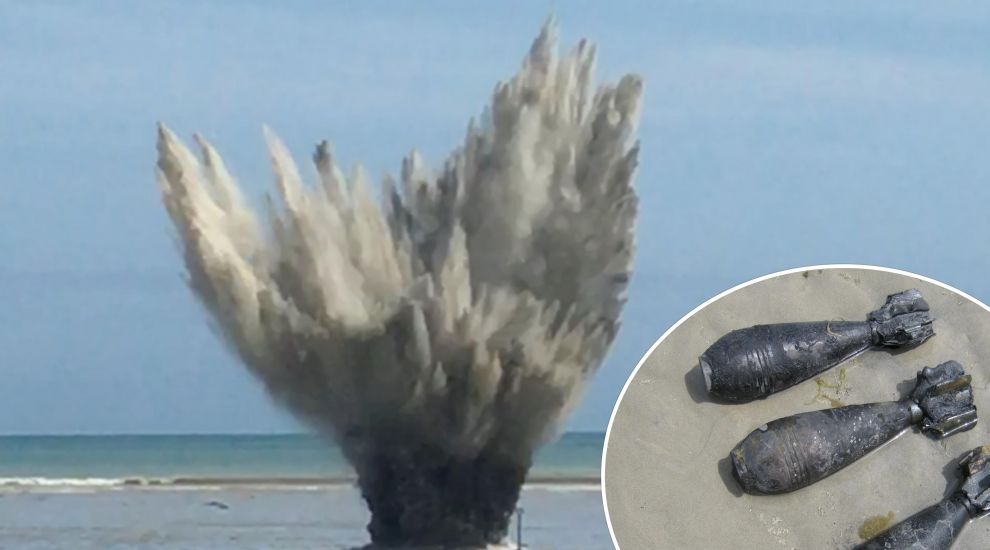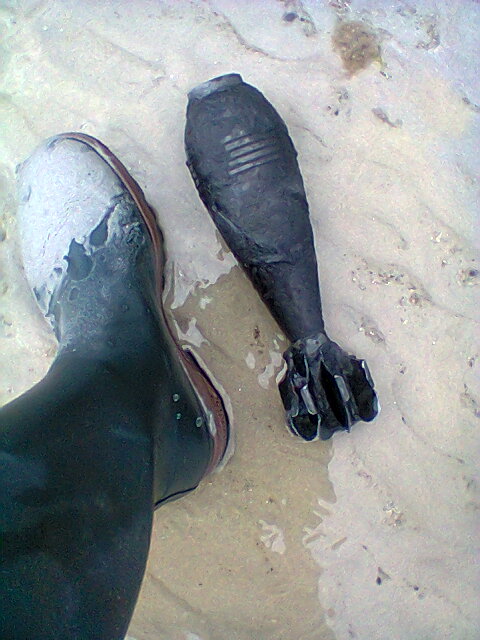

Three French mortar bombs, each containing approximately 400g of high explosive, have been destroyed in St. Aubin's Bay after being found by a metal detectorist.
One of the bombs had been damaged by the impact after it was originally fired, but it still failed to detonate.
A metal detectorist found a French 81mm high explosive French mortar in St Aubin’s Bay last week, close to the low water mark, around a thousand metres from La Haule slipway. He reburied the item as the tide was rising and Stuart Elliott, an Explosive Ordnance Diposal Officer, arranged to meet him on site to dispose of it. When Mr Elliott arrived on site, the detectorist told him he had found another two mortar bombs similar to the first one.
Mr Elliott explained: “French 81mm Mortar bombs were brought to the island during the German occupation as part of the defences especially along the coastal area. Each mortar contained approximately 400 grams of high explosive and had a range under certain circumstances of 3,000 metres.
“During the five years of occupation thousands of munitions were fired mainly during training exercises – on average up to a 20% failure rate could be expected due to defects etc…”
Pictured: The three mortars bombs were found close to La Haule Slipway in St. Aubin's Bay.
The three bombs were covered with sand to reduce the explosive effects, including noise and fragmentation. They were made safe in one controlled detonation, and the area was then checked and all the debris removed.
Mr Elliott explained the task was carried out in close co-operation with the States of Jersey Police, Jersey Coastguard and Air Traffic Control. The Jersey Electricity Company also assisted in establishing there were no power cables within close vicinity that may have impacted on the disposal task.

Pictured: Mr Elliott showing the size of one of the mortar bombs.
So far this year, some 33 items of ordnance have needed to be made safe, which is similar to 2017. The majority were found around the coastline, but some have also been discovered inland during agricultural or construction works.
While Mr Elliott explained that such items are unlikely to explode, they can still present a risk and therefore require caution. Wherever they are found, the advice is the same: if you suspect that the item might be a bomb, do not touch it, leave it in situ, note a general description and alert anyone in the immediate vicinity to move away. Then, notify the States of Jersey Police or the Duty Centenier who will contact bomb disposal experts.
“If it turns out to be a ‘frying pan’ – better that than a possible serious accident! Don’t poke them and they won’t poke you!,” Mr Elliott says. “They do contain explosive and the risk is in their unpredictability, they are inherently unstable and so should be treated seriously and left to the experts to dispose of correctly and safely.”
Comments
Comments on this story express the views of the commentator only, not Bailiwick Publishing. We are unable to guarantee the accuracy of any of those comments.